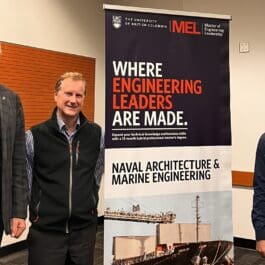Naval Architecture and Marine Engineering – Clifford Mascarenhas
Alumnus Story - Clifford Mascarenhas

The MEL in Naval Architecture and Marine Engineering enabled Clifford Mascarenhas to expand his technical knowledge and business skills – providing a foundation for the next chapter in his career: working in Vancouver’s shipyards as part of Canada’s shipbuilding industry.
After completing a degree in mechanical engineering, Clifford Mascarenhas completed a one-year marine engineering course and obtained his Class 1 international licence to be a marine engineer on a merchant navy vessel. He worked for over a decade at V.Group, advancing to a position of Chief Marine Mechanical Engineer.
In this role, he had an incredible array of responsibilities that included maintaining operational systems, ensuring compliance with new regulations, studying the feasibility of retrofit systems, commissioning new systems and leading teams to execute on their responsibilities.
“I had advanced in my career as far as I could, and I recognized that going back to school would enable me to pursue new opportunities by expanding my knowledge of ship-building,” he says.
“UBC’s program in Naval Architecture and Marine Engineering offered more than other comparable programs because of its combination of technical and business courses. Engineers need to understand how business decisions are arrived at, and this program helps engineers move into leadership positions by helping them correlate the technical and business aspects.”
A balanced curriculum of marine engineering courses
The MEL in Naval Architecture and Marine Engineering includes courses that cover the entire life cycle of a ship, from the initial design and vessel construction to operations, maintenance and eventual retirement.
Clifford came to the program with the goal of growing his knowledge of ship-building to balance his existing expertise in marine engineering. A first-term course on ship design and industrial production was therefore of great interest. Taught by adjunct faculty member Dan McGreer and Dr. Phil Koenig, the course introduced students to the design process as it happens in a shipyard.
Over the summer, he had the opportunity to work with Albion Marine Solutions as a technical project engineer. Among other responsibilities, he studied the feasibility of retrofitting ships with carbon capture storage systems and methanol-powered engines.
In addition to their courses on marine engineering and naval architecture, students take business and leadership courses offered through UBC Sauder’s Robert H. Lee Graduate School. These courses cover topics including organizational leadership, strategy and innovation, and sustainability and leadership.
“I came to a new appreciation of the influence of leaders on an organization’s ability to thrive,” Clifford says. “We reviewed business case studies, had interactive discussions and used business analysis tools to learn about innovations in leadership management,” he adds.
He also says he benefitted from mentoring over the span of his year at UBC. “Mr. Vitorio Stana, a highly experienced industrial professional, offered insights into career paths and the skills required to succeed, along with sharing his practical experience and assessment of current industry trends,” he says.
“Prof. Jon Mikkelsen was a great mentor for students who always encouraged us to do well. Finally, Clement Yim on the administrative side was always there for us when you needed someone to help you with administration or you wanted to do something extra at UBC.”
A job at Seaspan in Vancouver’s shipyards
Clifford says that one of his goals going into the MEL was to get a job at Seaspan, British Columbia’s largest ship builder and solutions provider to the maritime industry.
He achieved his goal and was hired in March 2024 as an integrated logistic support specialist, with responsibilities that include analyzing the reliability, availability and maintenance aspects of design for the joint support vessels that Seaspan is delivering to the Canadian Coast Guard and Royal Canadian Navy under Canada’s National Shipbuilding Strategy.
He encourages other students to make the most of the opportunities available at UBC, including those beyond their field of study. For example, Clifford took an elective in energy engineering, knowing the relevance of this topic to efforts to decarbonize the marine sector.
“Remember that there’s a lot more to this program than building new knowledge or advancing your career,” he says. “Vancouver is a beautiful city and going back to university and studying at UBC is an incredible experience in your life’s journey.”
Application Deadlines
The online application portal for the January 2025 has closed.
Get ready to apply!
Admissions for the 2026 intake will open on January 1, 2025.
How to ApplyJoin us for an
Info Session
Sign up for our latest online information sessions and discover what our programs have to offer.
Sign Up NowAssess your Eligibility
Determine if your professional experience and academic background make you a fit for your desired program.
Start AssessmentApplicant Guide
Navigate the application process with ease!
Sign up to receive tailored instructions and a detailed guide directly to your email.
Sign up
